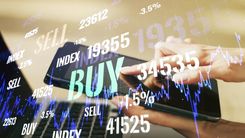

Nous utilisons des cookies pour, entre autres, offrir un support de chat en direct et afficher du contenu qui peut vous intéresser. Si vous êtes satisfait de l’utilisation des cookies par markets.com, cliquez sur Accepter.
Les CFD sont des instruments complexes et sont accompagnés d’un risque élevé de pertes financières rapides en raison de l’effet de levier. 75,2 % des comptes d’investisseurs particuliers perdent de l’argent en tradant des CFD avec ce fournisseur. Vous devez déterminer si vous comprenez comment fonctionnent les CFD et si vous pouvez vous permettre de courir le risque élevé de perdre votre argent.
Mercredi Mai 3 2023 10:43

6 min
Index trading can be daunting for newcomers. Here, we take a look at indices and how to trade them so you can potentially add them to your portfolio.
Indices essentially measure the price performance of a collection of stocks. These equities are listed on various exchanges around the world, such as the London Stock Exchange and New York Stock Exchange.
Each index and its constituent stocks are usually operated by an independent company. For example, the FTSE 100 tracks equities listed on the London Stock Exchange.
By tracking a wide range of stocks, an index basically shows the state of a particular market or industry sector or the general performance of a country’s stock market. The price performance of indices’ constituents is usually calculated as a weighted average.
Index trading, therefore, lets you speculate on a broader section of an economy or sector through a single position. At Markets.com, we let you do so through spread betting or by trading index contracts for difference (CFDs).
With this approach, you do not own the underlying asset. Instead, you can speculate on price movements, including if the price rises or if it falls (long vs. short).
Index traders have many options available to them. However, some indices are more popular with traders than others. Chances are you may see one or more of the following in an index trader’s portfolio:
These examples are fairly regional. Indices can track global trends, specific sectors and countries, or specific assets. For instance, the MSCI World Index tracks large-cap stocks in 23 countries. The Nasdaq Biotechnology Index covers biotech firms. The US Dollar Index looks at the performance of the US dollar. There are lots of options available to potential index traders. Which you choose depends on your individual trading strategy and goals.
Trading indices offers some attractive benefits to potential traders, including:
A quick word on risk. Indices trading is like any other form of trading: it carries substantial risk of capital loss. Its risks may be lower than some other forms of trading, but you can still lose money if the market turns against you.
As we offer indices trading using leveraged products like spread betting and CFDs, you trade on margin. While that means you can open a position with a fraction of the trade’s total value, it means your losses can also be amplified.
Only start trading if you are comfortable taking any potential losses.
An index’s price can be affected by multiple different factors:
Different indices are weighted differently. Weighting affects an index’s composition and subsequently its price performance.
A capitalisation-weighted index, such as the S&P 500, is weighted by the size of its constituents’ market capitalisation or value. The higher the value, the higher the representation in the index, so a high-weighted company’s performance, like Microsoft, will have a higher impact on the index’s overall price action.
A float-adjusted index means one that is weighted by all of the shares of its constituents that are freely available to the public.
There are many different weightings available, so do your research prior to committing any capital to get a good idea of how the index is composed and what this means for its performance.
Avertissement sur les risques : cet article ne reflète que les opinions de l'auteur et est fourni à titre indicatif uniquement. Il ne constitue en aucun cas un conseil en investissement ou une recommandation financière, ni ne représente la position de la plateforme Markets.com.Lorsque vous envisagez de négocier des actions, des indices, des devises et des matières premières ou de faire des prévisions de prix, n'oubliez pas que le trading CFD comporte un degré de risque important et peut entraîner une perte de capital.Les performances passées ne sont pas indicatives des résultats futurs. Ces informations sont fournies à titre informatif uniquement et ne doivent pas être interprétées comme servant de conseils d'investissement. Le trading de CFD et de spreads bets sur les crypto-monnaies est restreint au Royaume-Uni pour tous les clients particuliers.
Liste des actifs
Afficher la liste complèteDernier
Tout afficher
Mercredi, 6 Aout 2025

5 min

Mercredi, 6 Aout 2025

6 min

Mercredi, 6 Aout 2025

6 min